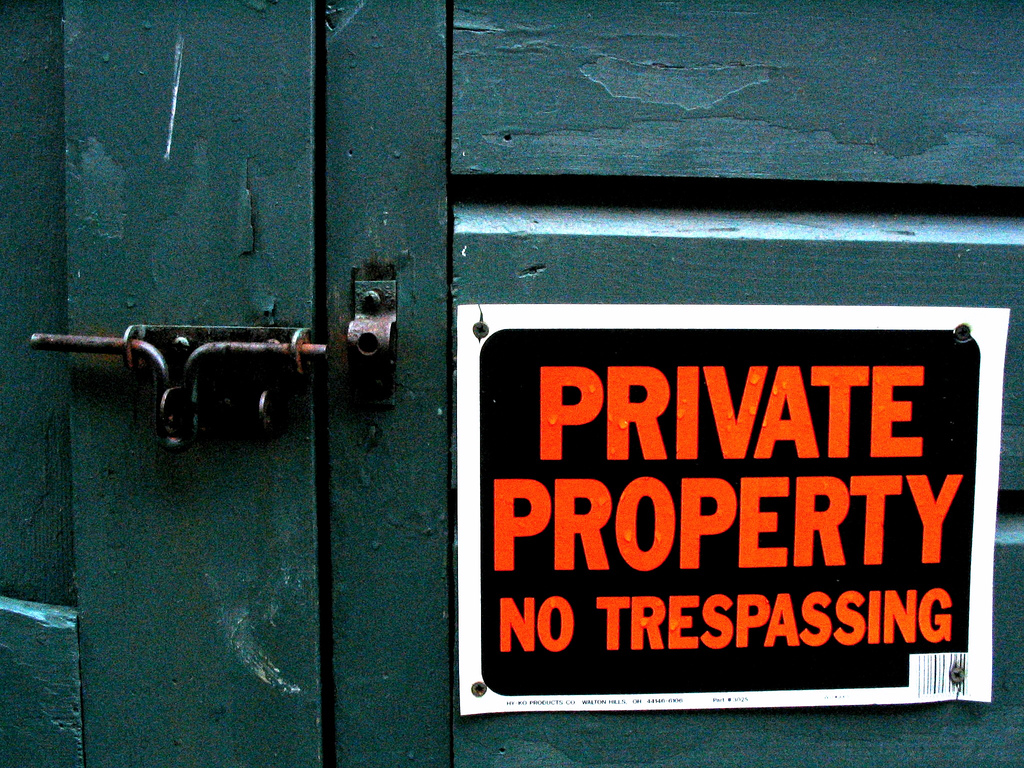
One reason townships hand over legal rights to road ends is when the access sites fall out of use. Photo: great_sea (Flickr)
In a region with the most freshwater access in the world, managing access to beaches where roads meet the water isn’t always clear.
Consider the options of Great Lakes townships:
– Protect public access and face decades-long costly lawsuits with waterfront property owners.
– Do nothing and watch tensions rise over use of the water, beaches and docks.
– Give up the waterfront property to adjacent owners and prepare for public disapproval.
The latter happens when road-end sites fall out of use or when waterfront property owners, concerned about privacy or safety, request or sue for ownership rights.
Some townships find it easier and cheaper to give the beach to adjacent property owners. In most Great Lakes states, the process involves the local municipality, the state’s department of natural resources and a public hearing.
Lately, Wisconsin legal experts worry about townships indiscriminately giving up access sites and about loopholes that make it easier for public beaches at the end of roads to end up in private hands.
Abandoning waterfront property
It’s not easy to give up waterfront property at road ends in Michigan, said William Carey, a Michigan attorney who typically represents waterfront property owners seeking ownership of public access sites.

A view of Lake Michigan taken during MSU's wilderness writing class fall 2009.
“Much more often than not, courts decline to vacate the road [end] ,” Carey said. “Courts have always favored the public interest in maintaining that road opposed to awarding the adjoining property owner. Michigan is not a state that easily gives up land.”
Wisconsin municipalities have to hold a public hearing and obtain approval from the department of natural resources to give up access.
Private property owners usually don’t want boaters or people on inland lakes, said Dale Simon, chief biologist of Wisconsin’s Department of Natural Resources Waterway Protection Section.
“They pay good taxes a lot of times and they get upset with people who don’t necessarily obey the law,” Simon said.
Wisconsin usually receives one or fewer requests every year for abandonment, Simon said. Decisions are made on a case-by-case basis. How easily the public can access the lake elsewhere is usually taken into account.
“Is this the only existing public access on this water body? If that’s the case, we’re not about to go along with abandoning a pubic access site on a public water body,” Simon said.
But if there are a significant number of public access sites, and those sites have the capacity for boat-launching and better parking, then Simon sees why the state would abandon a public access site.
Even then, “It’s clearly not to keep people out of public waters,” Simon said.
So the state may not easily abandon access, but there are loopholes and inconsistent application of the law regarding lakeside road ends, according to a 2010 Wisconsin Law Review article.
 Right now, the way a public access site was established determines how it can be abandoned in Wisconsin.
Right now, the way a public access site was established determines how it can be abandoned in Wisconsin.
In one case a family owned both shorelines of a creek next to a highway that fishermen used to access the stream. The highway was removed and because of a reversion law, the land reverted to the family, according to the article.
A Wisconsin court gave the family the roadway on both sides of the stream, essentially preventing public access. A fisherman sued and the state intervened, arguing that the abandonment required state approval. The state won.
“While this case is a victory for the State and the public interest, the fact remains that public-access law is still inconsistently applied, which puts public-access sites at risk,” according to the article.
A clear framework of statutes – all requiring state approval for abandonment – would fill any loopholes in the legal process, said Sarah Williams, author of the article.
And the state should establish a clear legal procedure for townships, which sometimes fail to follow proper procedures, to make the process easier.
Simon wouldn’t be surprised if townships indiscriminately gave public access sites to adjacent landowners. One of the main reasons municipalities abandon sites is because they have maintenance problems or they’re looking to save money, he said.
 Editor’s note: This story is part of an occasional series on public access to lakes at road ends.
Editor’s note: This story is part of an occasional series on public access to lakes at road ends.